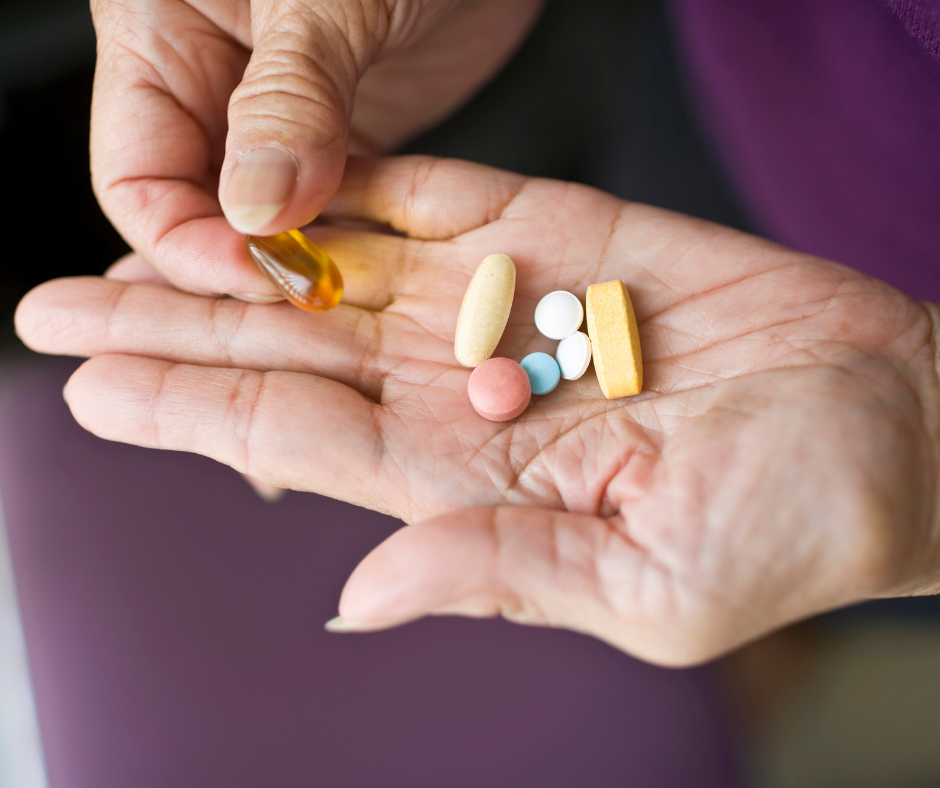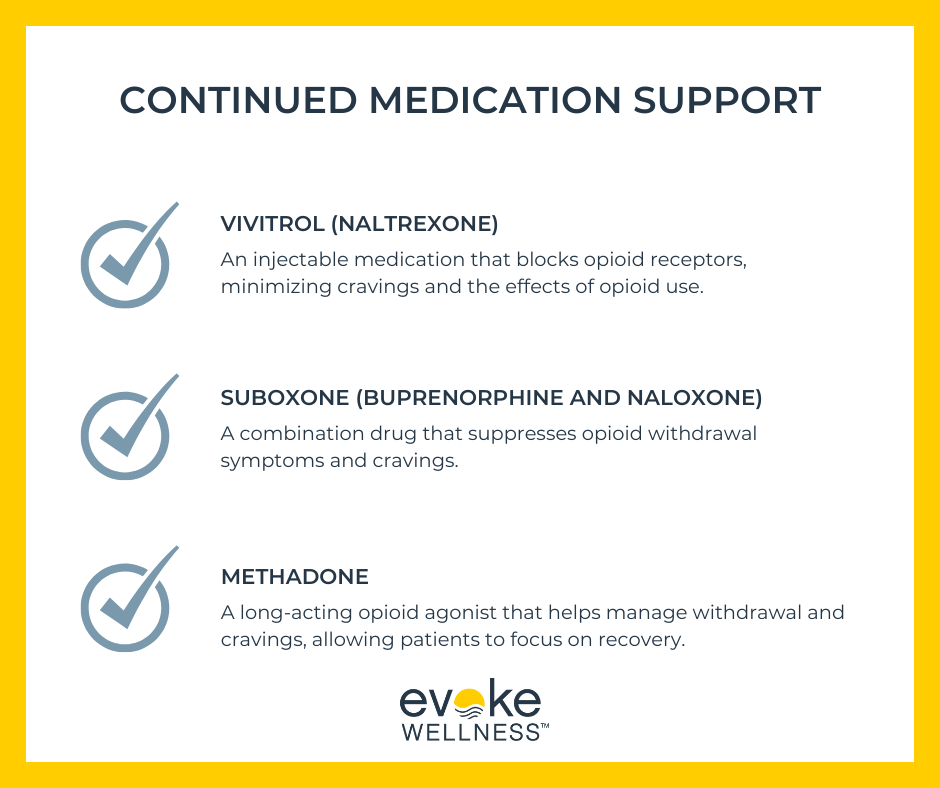When you’re struggling with addiction, the prospect of withdrawal can be daunting. Fortunately, modern detox centers utilize a range of medications to help ease this challenging process. At Evoke Wellness at Hilliard, our evidence-based approach incorporates pharmacological interventions to manage withdrawal symptoms safely and effectively. Recent studies show that medication-assisted treatment can increase retention in substance abuse programs by up to 74%. Whether you’re seeking acute detox, dual diagnosis treatment, or comprehensive substance abuse care, understanding how medications are used in detox is crucial. This article will explore the various medications employed, their benefits, and how they fit into holistic treatment plans designed to support your journey to recovery.
Together, let’s embrace the journey to recovery and the promise of a new beginning. Call us at (833) 949-1347 today or reach out online.
What Is Medical Detox?
A Supervised Process
Medical detox is a crucial first step in overcoming addiction and achieving sobriety. It involves eliminating addictive substances from the body under 24/7 medical supervision in a controlled environment. Trained professionals closely monitor vital signs and administer FDA-approved medications to alleviate withdrawal symptoms and cravings.
Safe and Supported
Attempting to quit “cold turkey” or without professional help can be extremely dangerous, even life-threatening in some cases. Medical detox provides a safe, trigger-free setting focused on your health and recovery. You have access to comprehensive care addressing any co-occurring mental health concerns through dual diagnosis treatment.
Improved Outcomes
Over 60% of individuals who complete a professional detox program remain sober after one year, compared to just 25% trying to quit alone. With 24/7 support managing withdrawal safely and comfortably, you improve your chances of successful long-term recovery.
The First Step
While detox addresses physical dependence, it’s only the beginning. After stabilizing through medical detox, you transition to comprehensive treatment like residential rehab, therapy, and aftercare planning. This full continuum of care gives you the tools and support for lasting sobriety.
Common Medications Used in Drug & Alcohol Detox
Benzodiazepines
Benzodiazepines like Librium and Valium are commonly used during alcohol detox. They help reduce the risk of life-threatening withdrawal symptoms like seizures by depressing the central nervous system. As stated on this page, these medications make the withdrawal process safer and more comfortable.
Opioid Replacement Therapies
For opioid addiction, medications like methadone, buprenorphine (Suboxone), and naltrexone (Vivitrol) are often prescribed. Suboxone contains buprenorphine and naloxone to reduce cravings and block opioid effects. Vivitrol, an injectable monthly medication, also helps prevent relapse by blocking opioid receptors.
Withdrawal Symptom Relief
Other medications aim to relieve specific withdrawal symptoms during detox. Anti-nausea drugs, over-the-counter pain relievers, anti-diarrheals, and sleep aids can be provided to manage issues like vomiting, muscle aches, diarrhea, and insomnia. This is crucial for heroin withdrawal, which produces extremely uncomfortable side effects.
Comprehensive Treatment
While medications play a vital role, detox programs combine them with counseling, behavioral therapies, and holistic care for long-term recovery. Treating psychological addiction alongside physical dependence offers the best outcomes.
Post-Detox Medications
Continued Medication Support
After completing the initial detox phase, many individuals benefit from continued medication support to help manage cravings and reduce the risk of relapse. Common medications utilized post-detox include:
These medications are typically integrated into comprehensive treatment plans, combined with counseling, therapy, and other evidence-based interventions for a holistic approach to long-term sobriety.
Managing Co-Occurring Disorders
For individuals with dual diagnoses, meaning they have both a substance use disorder and a co-occurring mental health condition like depression or anxiety, medication management is crucial. Evoke’s dual diagnosis program utilizes medications alongside therapies to simultaneously improve mental well-being and overcome addiction – a key strategy for preventing relapse.
Transitioning to Continued Care
Post-detox medications play a vital role in helping patients successfully transition from the initial withdrawal phase to further addiction treatment and continued care. With proper medical supervision and an individualized treatment plan, these medications can provide the support needed to establish healthy routines, develop coping mechanisms, and build a strong recovery foundation.
How Long Does Medical Detox Last?
Typical Duration
The typical medical detox program lasts between 5-10 days on average, though the precise duration can vary significantly based on several key factors. The substance of abuse, severity of the addiction, method and duration of use, the individual’s physical health, and any co-occurring mental health conditions all influence how long the detox process may take.
Stages of Withdrawal
There are generally three distinct stages of withdrawal that patients experience during medical detox:
- Withdrawal Onset (4-72 hours): Early withdrawal symptoms like cravings, anxiety, nausea, and sweating begin as the substance leaves the body.
- Acute Withdrawal (2-4 days): The most intense and potentially dangerous phase, where withdrawal effects peak and require 24/7 medical supervision and FDA-approved medications to safely manage.
- Post-Acute Withdrawal (weeks/months): Lingering psychological symptoms like mood swings, insomnia, and depression may persist for weeks or months after the acute phase, increasing relapse risk.
Factors Affecting Length
Some key factors that can prolong or shorten the detox timeline include:
- Substance type: Highly addictive drugs like opioids, alcohol, and benzodiazepines typically require a longer, more intensive detox compared to stimulants.
- Co-occurring disorders: Those with dual diagnoses involving mental health conditions like depression or anxiety often need a more extended detox period.
- Addiction severity: Individuals with long-term, heavy substance abuse patterns tend to experience more severe, prolonged withdrawal.
- Medical supervision: Professional detox programs with 24/7 monitoring can help safely accelerate the process using appropriate interventions.
With attentive medical care and comprehensive treatment planning, most patients can successfully complete the detox phase within 5-10 days and transition into the next stage of recovery.
Is Medical Detox Safe?
A Controlled Environment
Medical detox programs provide a safe, controlled setting for individuals to rid their bodies of addictive substances under close supervision. Attempting to detox alone can be extremely dangerous, even life-threatening, due to the severe withdrawal symptoms that often arise. According to Evoke Wellness Ohio, common withdrawal effects like nausea, muscle pain, anxiety, and seizures require professional intervention to manage safely.
24/7 Medical Care
At reputable detox centers like Evoke Wellness, patients receive round-the-clock monitoring and care from medical professionals trained in addiction treatment. This allows for appropriate medication administration to ease discomfort and vital sign checks to immediately address any health concerns. Counseling is also provided to support the mental and emotional challenges of early sobriety.
Personalized Treatment Plans
Rather than a one-size-fits-all approach, medical detox facilities tailor treatment to each patient’s unique history and needs through comprehensive evaluations. Factors like the type of substance(s) used, duration and severity of addiction, dual diagnosis considerations, and overall health are all taken into account. This personalized care helps facilitate a safe, comfortable detox process with minimal complications.
Transition to Ongoing Care
While critical, detox is just the first step in overcoming substance use disorders. After stabilizing, patients can seamlessly transition into Evoke Wellness’ residential treatment programs, intensive therapies, and other support services to address the psychological roots of addiction and build skills for lasting recovery. This comprehensive, medically-supervised continuum of care maximizes positive outcomes.
Next Steps After Detox
Transition to Comprehensive Treatment
After completing detox, the next critical step is transitioning into a comprehensive addiction treatment program. Detox alone is rarely enough to achieve long-term sobriety, as it only addresses the physical dependence on substances. To fully overcome addiction and prevent relapse, individuals must also address the underlying psychological, behavioral, and social factors that contribute to substance abuse.
Residential Rehabilitation
For those with severe addictions or co-occurring mental health disorders, residential or inpatient rehab is often recommended. These programs provide a structured, substance-free environment with 24/7 support and intensive therapy. Patients reside at the facility for 30-90 days, participating in individual and group counseling, behavioral therapies, life skills training, and holistic wellness activities.
Intensive Outpatient Programs (IOPs)
IOPs offer a step-down level of care for those who have completed detox and initial treatment. These programs allow individuals to live at home while attending several hours of therapy and counseling sessions multiple times per week. IOPs provide a balance of support and flexibility, making them ideal for those with work or family obligations.
Aftercare and Relapse Prevention
Even after completing a treatment program, ongoing support is crucial for maintaining sobriety. Aftercare services like sober living homes, outpatient counseling, support groups, and relapse prevention programs can provide the tools and accountability needed to navigate triggers, cravings, and high-risk situations. Building a strong sober support network is also essential for long-term recovery success.
The path forward after detox will vary based on each individual’s unique needs and circumstances. Working closely with addiction professionals can help determine the appropriate level and duration of treatment for the best chance at achieving lasting sobriety.
FAQ: How Do Detox Medications Help Ease Withdrawal Symptoms?
Managing Physical and Emotional Distress
Withdrawal from drugs or alcohol can lead to a range of unpleasant physical and psychological symptoms, making the detox process extremely challenging. Detox medications play a vital role in helping manage these symptoms and easing the discomfort experienced during withdrawal. Common medications used include:
- Buprenorphine, methadone, or clonidine to reduce cravings and alleviate symptoms like nausea, sweating, and insomnia.
- Benzodiazepines to prevent life-threatening complications like seizures.
- Antidepressants to address anxiety and depression.
Increasing Safety and Success Rates
By stabilizing the body and mind, detox medications help create a safer, more comfortable environment for individuals to focus on their recovery. This support increases the chances of successfully completing detox and transitioning into further addiction treatment.
Studies show that medically-supervised detox with medication-assisted treatment (MAT) can increase successful recovery rates by up to 68% compared to quitting “cold turkey.” Medications like Vivitrol, Suboxone, and methadone are often used in MAT programs to manage cravings and withdrawal.
Professional Medical Supervision
Detox medications are administered under close medical supervision in a professional detox program, where patients can be closely monitored, and their progress can be assessed regularly. Medical detox centers provide 24/7 care from trained staff who can adjust medication dosages as needed and ensure a safe, controlled environment.
By easing withdrawal symptoms, detox medications reduce the risk of relapse during the critical early stages of recovery. This lays a strong foundation for individuals to engage in comprehensive addiction treatment and build lasting sobriety.
Conclusion
As you’ve learned, detox centers utilize a range of medications to manage withdrawal symptoms safely and comfortably. Recent studies show that medication-assisted treatment can reduce relapse rates by up to 50% in the first year of recovery. By addressing both the physical and psychological aspects of addiction through dual diagnosis treatment and acute detox programs, these centers provide a comprehensive approach to healing. Remember, substance abuse treatment is not one-size-fits-all. The most effective programs tailor their approach to each individual’s unique needs. If you or a loved one is struggling with addiction, seeking professional help at a reputable detox center can be the first step towards lasting recovery and improved quality of life.
Begin Your Journey with Evoke Wellness at Hilliard
If you or a loved one is considering treatment, Evoke Wellness at Hilliard invites you to contact us. Our compassionate team is ready to answer your questions, discuss your needs, and help you take the first steps toward recovery. In Hilliard, you’ll find more than just a treatment program – you’ll discover a community dedicated to your wellness and success. Together, let’s embrace the journey to recovery and the promise of a new beginning. Call us at (833) 949-1347 today or reach out online.



